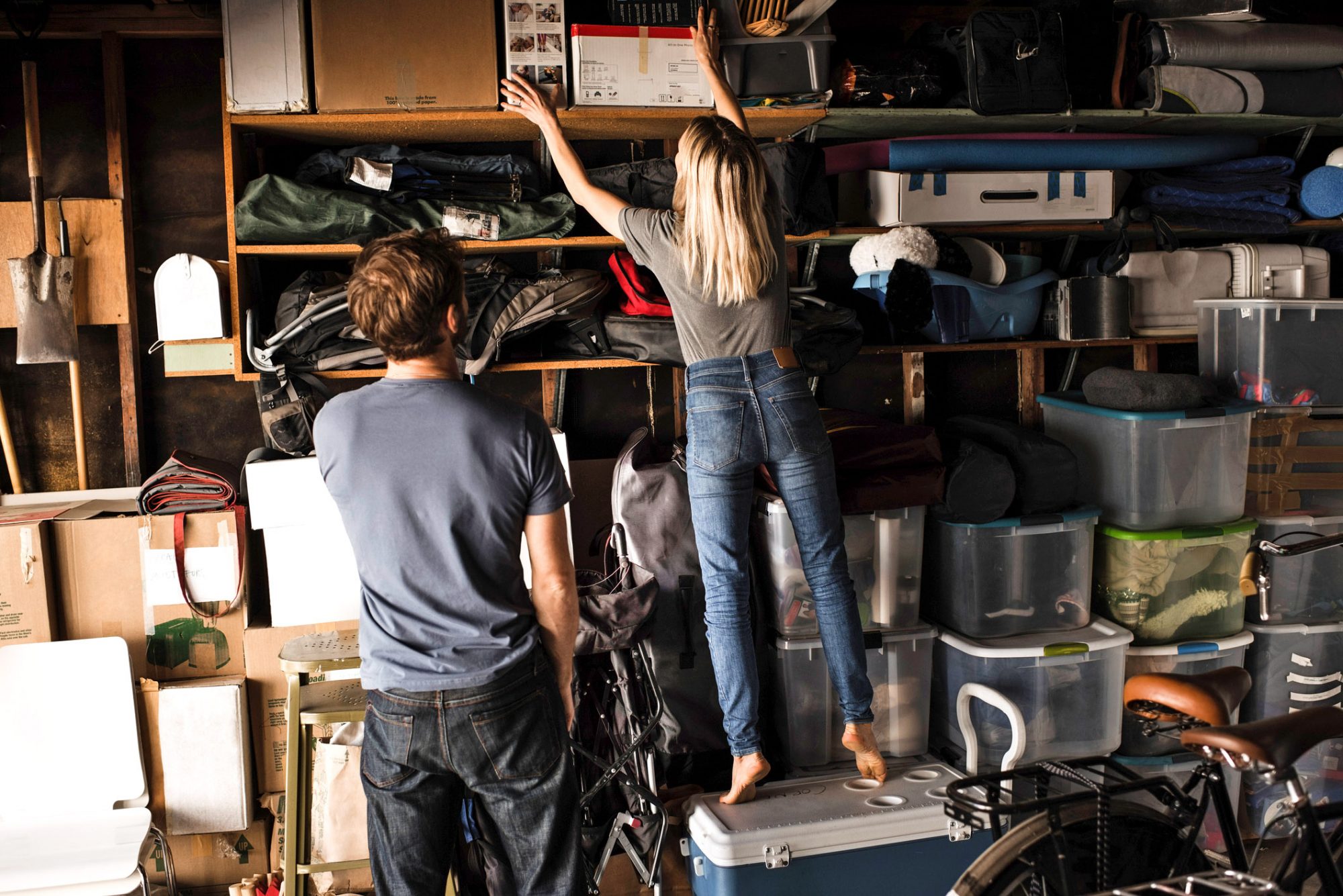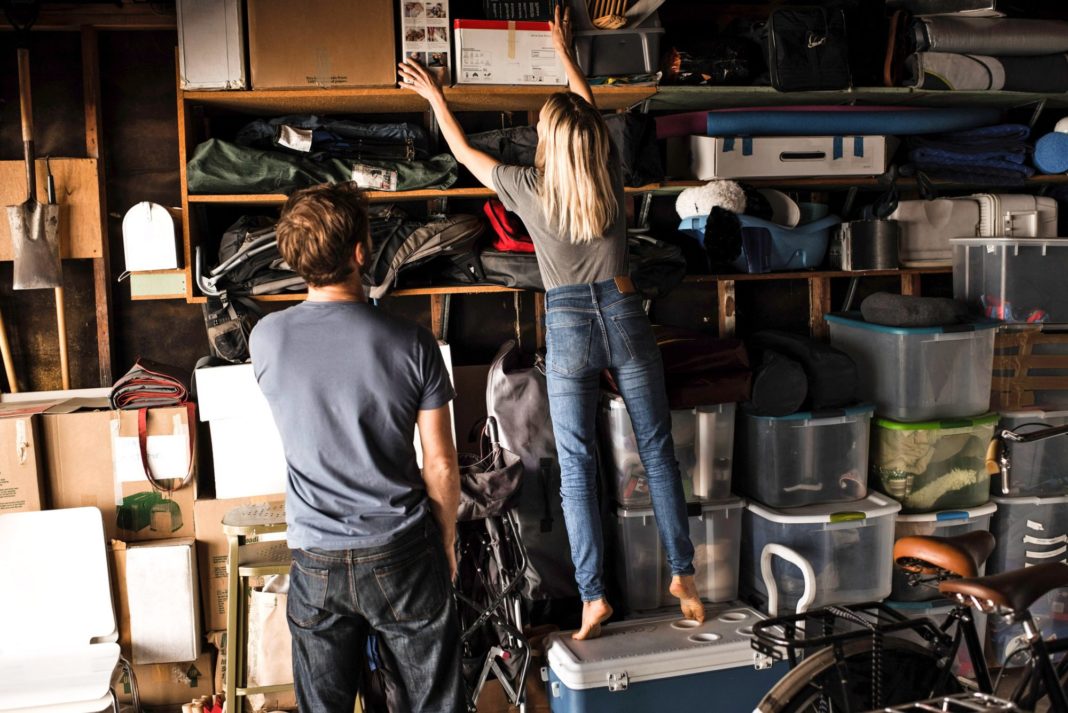For a long time, Chrischeryl McDaniel, a mom of three in Grand Prairie, Texas, was struggling with a boundary issue right inside her own home. She was "holding space" for others and creating unnecessary pressures on her well-being. This form of codependency—or the inability to independently function—builds one's thinking and behavior around another person. It's something experts say can stem from childhood and seep into parenthood.
"My mom and aunts grew up poor, and as they purchased new items for their homes, we became the recipients of their hand-me-down furniture," says McDaniel. "I did not realize until last year that these 'good pieces' were clogging my life literally and figuratively."
McDaniel is far from alone in her need to declutter and set boundaries for herself. Fifty-four percent of Americans are overwhelmed by the amount of clutter they have, and 78 percent have no idea what to do with it. An unorganized home also has financial implications. The average American spends $18,000 per year on non-essential items, Americans collectively dish out $2.7 billion every year replacing the things they can't find, and 80 percent of the items people keep are never used.
We've seen all these statistics play out on popular shows, such as The Home Edit and Hoarders. Still, not everyone understands the connection between home organization and human behavior, and how becoming a parent can make unresolved issues even worse. Home organization can be particularly hard for parents, says author Joshua Becker who has written four books on minimalism and intentional living, because "children certainly make decluttering more difficult, but they also make it more important."
Courtney Boyer, a certified life coach currently stationed in Landstuhl, Germany, says home clutter indeed goes deeper than one might think. "I've often found, both with myself and with my clients, that the more chaos we are in reflects the chaos that is within," says Boyer. "Honoring ourselves enough to know what deserves space, whether it's in our home or relationships, is critical and something so many are not taught. It's usually a crisis that causes one to reckon with the overwhelm, physical and emotional."

Why Parents Need to Declutter
Home organization has parents' minds more because of COVID-19, says author and licensed therapist Shari Botwin, LCSW, based in Cherry Hill, New Jersey. "Our homes have become the place where we need to manage boundaries at work and home simultaneously," says Botwin. "But being able to let go of things around the home can be difficult."
That's especially true for parents whose messiness stems from past trauma. "Hoarding often comes from traumatic loss and how one's money story—what your family taught you about money—impacts the way you spend, how you spend, and what you 'allow' for yourself," says Kimberly Perlin, LCSW-C, a psychotherapist in Maryland, specializing in helping women from emotionally chaotic homes live differently than how they were raised. "Most folks with trauma were trained from an early age to focus on others' needs and not explore their own."
But it's been proven that stress levels are directly proportional to the amount of stuff in our homes, which of course increases once kids come into the equation. Decluttering can help parents create healthy boundaries, which is a form of self-care—both are needed more than ever during the pandemic. Lack of boundaries can lead to stress, burnout, and codependency.
One of the best ways to manifest healthy boundaries through home organization is by permitting ourselves to purge, whether it's our own items or those left behind by others. "We must ask ourselves, 'is this my responsibility?" says Alex Greenwald, MHC-LP, a licensed therapist in New York who focuses on trauma, life transitions, relationships, depression, anxiety, and stress. Many Americans hold on to items on the off chance a friend or family member may need it in the future. But this could speak to a more significant boundary issue: Are you allowing everyone to come to you with a problem? Are you making the problems of others your responsibility to solve? Learn to let others step up and manage their needs without you taking over.
Botwin also encourages parents to say intentions and statements while organizing, such as it is OK to let go of this, the memory of this person is in my heart and mind, and making space for myself is good self-care.
The Aftermath of Decluttering
It's been proven that getting rid of clutter eliminates 40 percent of housework in the average home. Connecticut mom and therapist Kelly Lynch has seen other positive impacts on her clients too. "There is consistently an overall reduction in anxiety and depression, increased feelings of self-worth and self-efficacy, and increased confidence in their belief about their ability to manage their world," says Lynch.
As a single mother to an 8-year-old daughter, Lynch had to address these boundaries herself and instill them in her child. "In getting divorced, I reduced the size of my home, reduced my belongings, and have set consistent and clear boundaries with my daughter as she's gotten older, regarding cleanliness, tidiness, and general appearance of the home we share," she says.
Washington mom Shantae Duckworth believes her family's mental state is better after decluttering and organizing their home. "I was not able to see clearly with all the mess that was distracting me," she says. "Letting go of items and memories is hard and emotional work, but the mindset that you gain later is worth it."
As for McDaniel, she decided to finally clean and organize her house one room at a time. As the clutter left, McDaniel felt free of the expectations of living her life according to the rules older generations set for her as a child. "Expectations of putting everyone in front of my needs and desires," she says. Before, McDaniel allowed her older children to store items at her home, but after organizing she started to realize she could love her children—and even have space for them at her home—but within the boundaries she set.
































